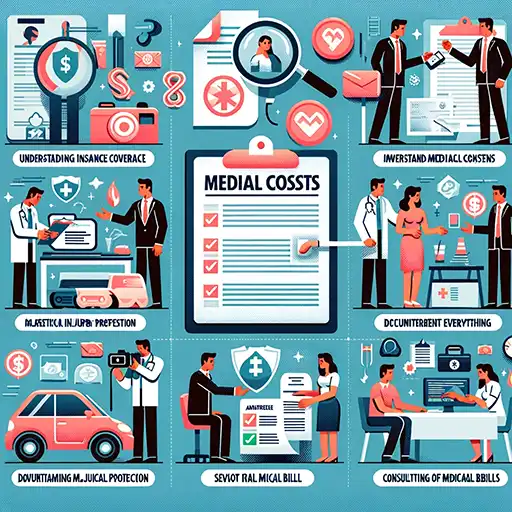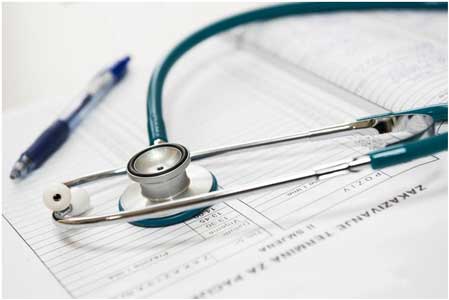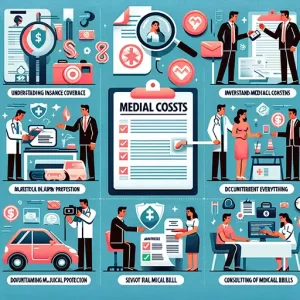Car accidents can be traumatic and costly, not just emotionally and physically, but also financially. Medical expenses after a car accident can quickly escalate, leaving you stressed about how to manage the costs.
The median cost for an emergency room visit according to the National Institute of Health is around $1,233. This Is a best-case-scenario since you are likely to need more pricey treatment after a car accident. Here are some practical steps you can take to prevent high medical costs after a car accident.

Table of contents
- 1. Understand Your Insurance Coverage
- 2. Seek Immediate Medical Attention
- 3. Document Everything
- 4. Use Med pay or medical payments
- 5. Use Your Personal Injury Protection (PIP) If Available
- 6. Negotiate Medical Bills
- 7. Consider Legal Advice
- 8. Plan for the Long Term
- 9.Check for Errors in medical billing
- 10. Lower Drug Cost
- 11.Talk to Your Doctor
- 12. Know the Costs
- Conclusion
1. Understand Your Insurance Coverage
Before anything happens, familiarize yourself with your car insurance and health insurance policies. Know what your insurance covers in terms of medical expenses, hospital stays, and rehabilitation services. Understanding the extent of your coverage, including any deductibles and out-of-pocket maximums, can help you plan financially in case of an accident.
In most personal injury cases, health insurance will not pay for medical expenses. However, there are other ways to obtain medical care.
Tip: Contact your insurance providers to clarify any confusing terms or conditions. It’s important to know whether your health insurance can cover injuries from car accidents and how it coordinates with your auto insurance.
2. Seek Immediate Medical Attention
Even if you feel fine after an accident, some injuries, like whiplash or internal bleeding, may not be immediately apparent. Seeking prompt medical attention ensures that these injuries are diagnosed and treated early, which can prevent complications and higher costs down the road.
Tip: Use accident doctor group providers whenever possible, as this can significantly reduce your out-of-pocket costs.
3. Document Everything
From the moment the accident occurs, start documenting everything. This includes taking photos of the accident scene, collecting contact information from witnesses, and retaining all medical receipts and records. This documentation is crucial for insurance claims and can help ensure that you receive maximum coverage for your medical expenses.
Tip: Keep a detailed log of your medical treatments, including dates, names of the healthcare providers, and the type of care received. This will be invaluable during the insurance claims process.
4. Use Med pay or medical payments
If you have medical payments on your auto insurance policy, use it. Med pay was designed to pay for medical care up to the amount you select.
Tip: Your doctor can help you file for Med pay and file most of the paperwork for you
5. Use Your Personal Injury Protection (PIP) If Available
If your auto insurance includes Personal Injury Protection (PIP), make sure to utilize it. PIP can cover medical costs, lost wages, and other expenses regardless of who is at fault in the accident, which can alleviate financial pressure while you recover.
Tip: Check the limits of your PIP coverage and understand how it works in conjunction with your health insurance.
6. Negotiate Medical Bills
Don’t hesitate to negotiate medical bills. Some medical providers may offer discounts or payment plans if you’re facing financial difficulties or if you can pay a substantial amount upfront.
Tip: Ask for an itemized bill and review it for any errors or charges for services you didn’t receive. Mistakes can happen and identifying them can reduce your bill.
7. Consider Legal Advice
If the accident involves disputes over fault, or if your insurance company refuses to cover certain expenses, consulting with a legal professional can help. A qualified attorney can navigate the complexities of insurance claims and help secure compensation to cover your medical bills.
Tip: Many personal injury lawyers offer a free initial consultation and work on a contingency basis, meaning they only get paid if you receive a settlement.
8. Plan for the Long Term
If your injuries require long-term care, consider speaking to a financial advisor to plan for future costs. This might include ongoing physical therapy, modifications to your home to accommodate disabilities, or long-term medication needs.
Tip: Investigate supplemental insurance plans like critical illness insurance, which can provide additional coverage for severe injuries.
9.Check for Errors in medical billing
Every time you receive medical treatment, make sure you ask for an itemized bill. This is different than the explanation of benefits (EOB) you might receive from an insurance provider after your treatment. Errors aren’t uncommon on these bills, so this is a great place to look for problems.
If you notice any discrepancy, talk to your provider. Something might have been marked incorrectly at the time of treatment, and this might have led to you being overcharged. In addition, if your insurance didn’t cover as much as you expected, talk to them as well. Don’t let an error lead to you being out of pocket for extra expenses.
10. Lower Drug Cost
One of the biggest costs after an accident is the ongoing need for prescriptions. Luckily, this is one of the easiest ways to lower the overall cost of treatment. Start by asking about generic prescription options. Generic drugs use the same active ingredients and they’re completely safe, yet they pack big discounts.

Shop around for the best price. Like with health services, you need to shop around to get the best prices. Often big-name retailers have the lowest prices, but that isn’t your only option. Many mail order services offer discounts on common prescriptions drugs, and you don’t always need health insurance. Once again, talk to your doctor about the best options for your price range.
Tip: GoodRX is very helpful for finding discounts on prescriptions
11.Talk to Your Doctor
Doctors work with your best interest at heart, but they might not consider the financial consequences if you’re not open with them. Ask if your physician really recommends all these tests and procedures, or if perhaps there is a cheaper alternative. You might find there are more options than you think. Many doctors are willing to help you find a treatment you can afford.
12. Know the Costs
If possible, do your research before you seek treatment. You can find a lot of information about the service costs of many different tests, treatments, and more online. Your insurance will also share how much coverage they offer for different health services. Knowing the costs ensures you’re an informed, capable customer who can speak up during treatment.
In addition to looking for prices online before your treatment, don’t be afraid to talk to your doctor or medical provider. They can always provide an estimated cost before you receive treatment. Knowing The cost before you schedule the appointment helps you stay in control of your money.
Conclusion
Preventing high medical costs after a car accident largely revolves around preparation and prompt action. By understanding your insurance, seeking immediate medical attention, and effectively managing your care and documentation, you can alleviate the financial burden of an already stressful situation. Remember, it’s always better to be proactive about your health and finances, particularly when it comes to potential accidents.
After a car accident, you want to move on with your life as quickly as possible. These tips above will make it easier to keep your costs lower after a car accident. Don’t accept the first price as the best price when it comes to your medical treatment. It’s always worth standing up for your budget. Find a Accident doctor near you!


